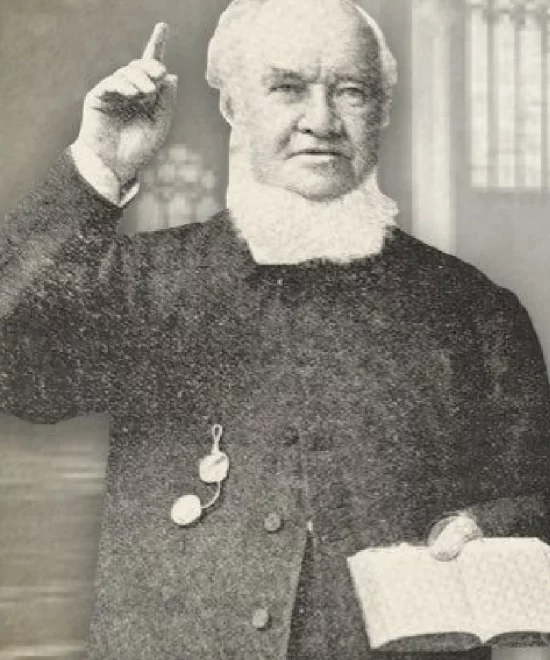David Alfred Doudney – Evangelical Clergyman
History
David Alfred Doudney, the son of a soapmaker, was born at 386 Mile End Terrace, Portsea, Hampshire on 8 March 1811. (Charles Dickens was born in the house next door.)
Doudney left Southampton in 1832 and began working for Jowett & Mills, printers of Bolt Court, Fleet Street. He soon set up in business on his own behalf as The City Press, firstly in Holloway and then in Aldersgate
He was greatly influenced by John Griffin, the minister at King Street Independent Chapel, Portsea. When he was 13, he was articled to a printer in Southampton, and later joined the staff of the Hampshire Advertiser. In 1826, aged 15, he had a powerful conversion experience.
1846 in Ireland is the time of the great potato famine. The potato crop had failed for the second year running, despite the blessing of the crops by the local priests. Doudney went from hovel to hovel, distributing to the inhabitants a bag of meal or a pint of soup.
He sketched out the scenes he witnessed. Man a sinner, Christ a Saviour is the one theme of our mission. Salvation without money and without price and irrespective of the intercession of Mary, Peter or the saints.
Besides famine relief, his work at Templemore included preaching at the barracks once a week, visiting and speaking at the two hospitals, going into the mountains two or three times a week to visit and teach the Protestant children in the tiny unendowed school. He also had to preach at the scattered farmhouses.
He was ordained in June 1847 and appointed to the curacy of Bonmahon. On arriving, he wrote, One’s heart perfectly sickened at beholding the filth that presented itself on every hand. It seemed unendurable. The people are, for the most part, cradled in ignorance, superstition, and the most inveterate hatred of everything English or Protestant. The difficulty of combating the deep-seated prejudices of the Roman Catholic peasantry of Ireland none can imagine.
By 1848 his wife and children had joined him. In this year of the rebellion, the Protestant population were to be massacred. Rumour had it that this was to take place on a Sunday evening. All the Protestants in the village were in great alarm, the four coastguards were patrolling the place and it was arranged that at the first alarm all were to fly to the curate’s cottage…. I cannot tell you how sickening a sight it was to see these armed men, the coastguards, and their store of weapons in our peaceful cottage. Then evening came, and just before eleven in rushed the servant shrieking, ‘they’re coming! they’re coming!’ Snatching the baby from the cradle my dear wife flew upstairs to the other three children…. Oh the anguish of that moment, and yet how many of the Lord’s own children have encountered such in all its disastrous consequences! But how shall I tell you my relief when that agonizing suspense was broken some hours later by the information that the party seen in the distance were police and not the expected assassins. Oh the interposing goodness of a gracious God! Never, never shall I forget it. The crisis was averted by the suspension of Habeas Corpus, and the rebellion petered out.
After four years in the parish, Doudney had the idea of setting up a printing school for the local boys. The presses and type had to be purchased, the boys had to be taught how to read, to set type, to proof-read, and the art of printing and binding. The paper had to be imported and the finished books had to be sold and distributed.
Doudney went ahead and in 1851 through the Gospel Magazine he obtained subscriptions for reprinting John Gill’s Commentary on the Bible. This was completed in six volumes in 1853. The commentary contained “nearly 47 million letters” and the 2250 sets printed required 25 tons of paper, comprising eight-hundred thousand separate sheets. But Doudney’s watchword was “Forward” and he continued with the work, printing, not only the Gospel Magazine and Old Jonathan which had a monthly circulation of 15,000 but the printing school reprinted Rutherford’s Letters, Gill’s Sermons on the Song of Solomon, Gill’s Cause of God and Truth, Keach’s Scripture Metaphors and his Exposition of the Parables etc. (Interestingly, most of these books have been reprinted by photolithography in recent years).
Doudney’s ministry in Ireland came to an end in 1857. Through his ministrations a prominent local Roman Catholic was converted. When this was found out, the man said that he dared not stay in Ireland for fear of his life, so he left Ireland and he went to London and found work there. The blame for all this, naturally fell on Doudney. Anathemas were pronounced by the priests, an effigy of him was carried through the streets and publicly burnt, with one young man firing a blunderbuss at the effigy. He received a number of anonymous death threats and considered that he was unable to continue in this situation any longer. Moreover the work at the printing schools could not be maintained. Printing work was difficult to obtain and costs exceeded income. Reluctantly Doudney closed the printing schools and concluded that his ministry at Bonmahon was ended.
He moved to Bristol, and was in charge of the newly established parish of Bedminster from 1859 to 1890. He died in Southsea in 1893.


